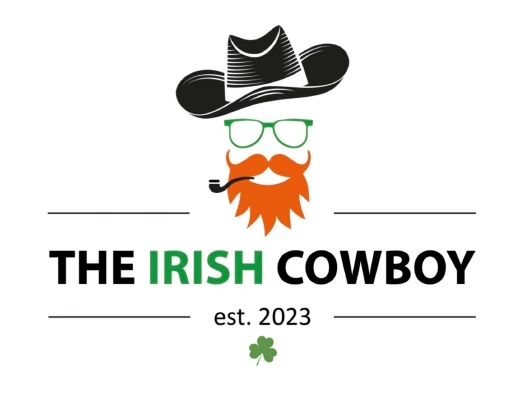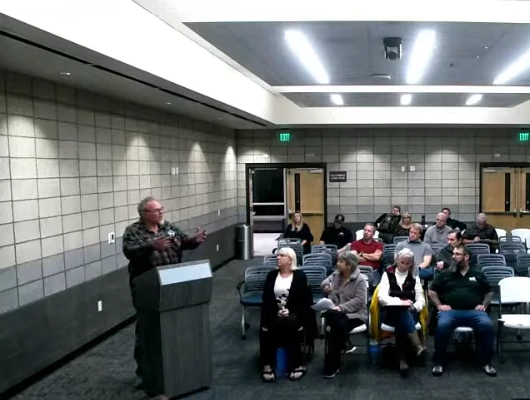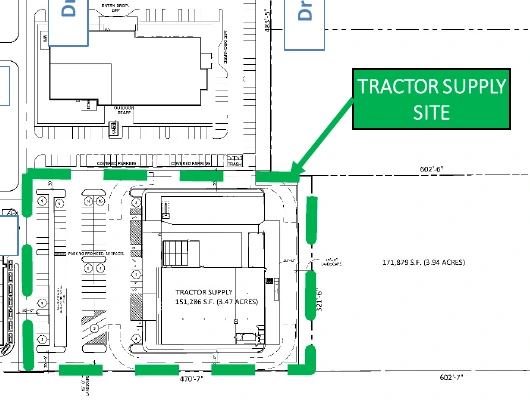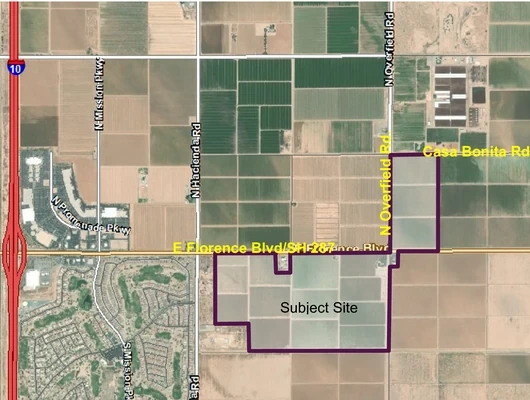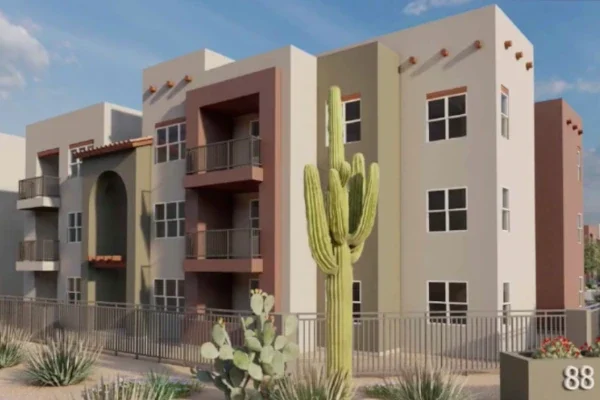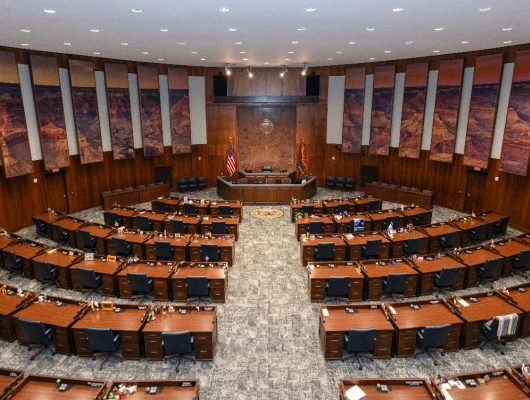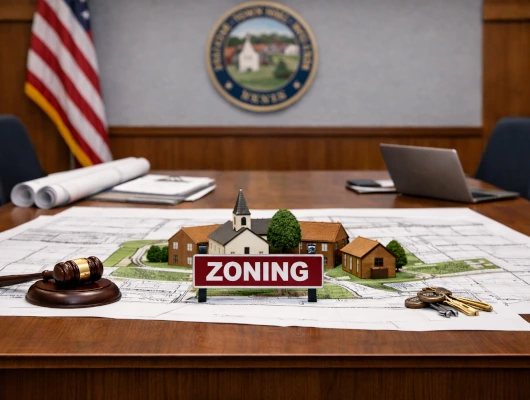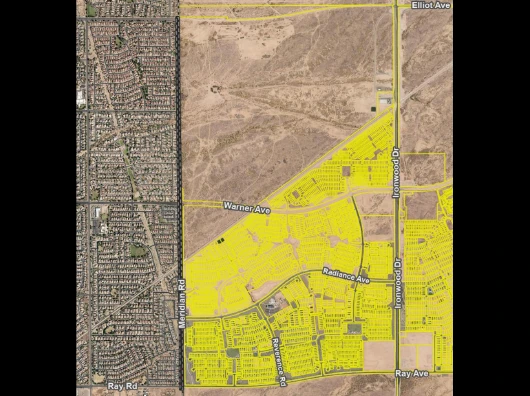Town officials back bar license application after debate over Main Street character
The Florence Town Council voted 6-1 on October 7 to recommend approval of a liquor license transfer that would allow The Irish Cowboy to operate under a bar license instead of a restaurant license. The application, submitted by The Irish Cowboy LLC with Jared Repinski serving as agent, seeks a location transfer of a Series 006 liquor license from the 1866 Group LLC to The Irish Cowboy’s location at 305 North Main Street.
The applicant’s representative did not attend the meeting, having a family event to attend, according to Deputy Town Manager Lisa Garcia.
About the Businesses
The Irish Cowboy is an Irish pub on Main Street Florence that currently operates under a restaurant license. The establishment, founded by husband-and-wife team Kevin and Sabrina Johnston from Ireland and Scotland, serves traditional Irish fare and beer.
The 1866 Group LLC is also owned by the Johnstons and operates multiple businesses in Florence, including the Country Store, Country Tea House, and Country Saloon.
Bar License vs. Restaurant License
The license transfer will fundamentally alter how The Irish Cowboy can operate. Currently, the establishment holds a restaurant license requiring 40% of its revenue to come from food sales. The Series 006 bar license removes this requirement.
“Right now, the Irish Cowboy has a restaurant license. That means 40% of the sales have to come from the sale of food,” Garcia explained. “So what they’re doing is they’re transferring a 6 License from the 1866 location to the Irish Cowboy. So it will actually be a full bar license.”
Garcia explained that with a restaurant license, establishments must calculate for the state how much revenue comes from food sales. “Once you separate from this, it means they no longer need to calculate for the state how much revenue is brought in independently and from food,” she said.
The change would allow The Irish Cowboy to close its kitchen early while keeping the bar open later. Council Member Tony Bencina clarified this point: “This would allow them to, let’s say they want to shut the restaurant portion down, the kitchen. Let’s say they want to shut it down at eight o’clock, but they want to stay open till 10 o’clock or midnight with no food. This would allow them to do that, right?”
Garcia confirmed this was correct.
The Series 006 license also grants the ability to sell packaged liquor for off-premises consumption, though Arizona law limits off-sale privileges to no more than 30% of total annual liquor sales receipts. Town Attorney Stephen Cooper noted that “basically you can sell packaged goods to take out of the site there.”
Understanding License Transfers
In Arizona’s liquor licensing system, a Series 006 bar license qualifies as a “quota” license, meaning the state limits the total number available by county. These licenses can transfer from person to person and location to location within the same county.
“A Series 006 liquor license is actually one of the most difficult license to get, and it’s on the lottery system,” Garcia told the council. “And so, they’re upping from just a basic restaurant license to an actual Series 006 license.”
When quota licenses become available, interested parties must either purchase them on the open market or obtain them through the state’s lottery system. People “are on the hunt for Series 006 licenses all the time, and they will get them and transfer them so that they can open a bar in another location,” Garcia said.
Council Member Nicole Buccellato sought clarification about the lottery system. “And Lisa, just to know, when you say the lottery system, I believe that they need to either obtain it from somewhere or buy it from an auction at this time in Arizona. Is that correct?” she asked.
Garcia confirmed that license holders pursue these transfers to open bars in new locations.
Council Members Raise Concerns
Council Member Jose Maldonado expressed concern about patrons drinking without food available. He noted that he had recently visited The Irish Cowboy at 8:05 p.m. and was turned away because the kitchen had already closed at 8:00 p.m. “I’m hoping that this doesn’t make it so that way they serve less ’cause one of the things is when you’re serving liquor, you at least want to have snacks and bar food,” Maldonado said. “The last we want is having someone get inebriated because they don’t have something to munch on while they’re drinking alcohol.”
An important operational constraint emerged during the discussion. Under the current restaurant license, The Irish Cowboy must stop selling liquor when it stops selling food. Mayor Keith Eaton, with a touch of humor, thanked Maldonado for his “extra research” the previous night, noting he hadn’t realized restaurants with liquor licenses face this restriction. The bar license would eliminate this constraint, allowing The Irish Cowboy to continue serving alcohol even after the kitchen closes.
Vice-Mayor Cathy Adam expressed reservations about the license transfer. “I think it’s unfortunate the applicant couldn’t make it tonight, because I have the same question the mayor had, and I would like to know if they are going to continue to serve food or not,” Adam said. “I do not want just a bar on Main Street. So I’m not understanding why this transfer.”
She continued: “On our Main Street, we have so many restaurants and so many family-friendly events there now. I wouldn’t want to see our third Fridays and have just a bar right in the middle of our third Friday.”
Adam also raised concerns about competition with existing businesses. When learning about the off-sale privileges, she said: “Because then that changes the discussion. If they’re selling alcohol, that’s direct competition to our only market on Main Street.”
Council Member Arthur Neal offered a contrasting perspective on the application. He noted that customers are unlikely to purchase packaged alcohol from a bar at retail prices when cheaper options exist at convenience stores. Neal also reflected on Florence’s history with bars on Main Street, recalling when the town had eight or nine such establishments. “I mean, I totally understand about the food. We don’t want to lose that fact, but, I mean, Irish Cowboy has been good to Florence, and they’re a bar,” Neal said. “Their main purpose would be the alcohol. I mean, they’re not a restaurant, they’re a bar.” He concluded that the establishment is still a bar where people socialize and have a good time, making the license appropriate.
Public Input
The town posted notice of the application for 20 days as required by Arizona law. Garcia reported that the clerk’s office “received zero input either favorably or against the application.” No members of the public testified during the public hearing. However, one online participant, Sherri Hahr, asked questions about a separate expansion project that was not part of the license transfer application.
State Review Pending
Mayor Eaton clarified that the council’s vote serves as a recommendation to the Arizona State Liquor Board, which makes the final decision. “Your recommendation tonight basically goes to State Liquor Board. They have the final say on this matter,” Cooper confirmed.
Council Member Nicole Buccellato made the motion to approve, which Council Member Maldonado seconded. The final vote was 6-1, with Vice-Mayor Adam casting the sole dissenting vote.
Plans for New Services
The Irish Cowboy announced on social media plans for expanded services following the council’s approval. According to a Facebook post, the pub has announced plans to introduce catering and events with beer, beer to-go in 4-packs, 6-packs and growlers, take-away margaritas and cocktails, and expanded DoorDash alcohol delivery.
The Irish Cowboy can continue operating under its restaurant license while the State Liquor Board reviews the application. If the state board approves the transfer, The Irish Cowboy will gain operational flexibility to remain open for bar service even after kitchen hours end. The pub would then launch its planned expansion of to-go and delivery services. Questions remain about whether the establishment will maintain its current food service or reduce its culinary offerings.
